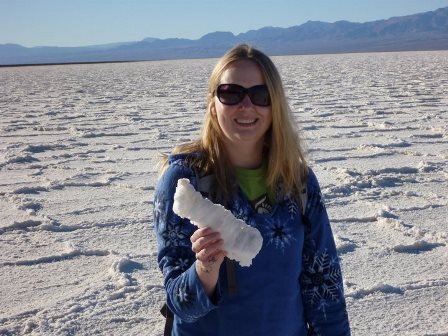Bachelor of Science with a Major in Geography, Environmental Sustainability
Environmental Sustainability focuses on interactions between biophysical systems, social systems, and human practices and the well-being and long-term survivability of each.
For more information, please see the Academic Catalog. A program map, which provides a guide for students to plan their course of study, is available for download in the Courses tab below.
Geography is the study of the interactions between people and places, local and global processes, and social and biophysical systems. It is an integrative discipline in which scholars endeavor to understand the role of humans in producing the social and biophysical worlds in which they live. Geographic knowledge can be applied to explain cultural and political conflicts, environmental policies and practices, human landscapes, and economic well-being. Modern geographical analysis typically involves cartographic and geospatial techniques (GIS) and both qualitative and quantitative methods.
Career Opportunities
Link to Additional Career Information:
https://www.buzzfile.com/Major/Environmental-Studies
External Resource
Program Location
Carrollton Campus
Method of Delivery
Face to Face
Accreditation
The University of West Georgia is accredited by The Southern Association of Colleges and Schools Commission on Colleges (SACSCOC).
Credit and transfer
Total semester hours required: 120
This program may be earned entirely face-to-face. However, depending on the courses chosen, a student may choose to take some partially or fully online courses.
Save money
UWG is often ranked as one of the most affordable accredited universities of its kind, regardless of the method of delivery chosen.
Details
- Total tuition costs and fees may vary, depending on the instructional method of the courses in which the student chooses to enroll.
- The more courses a student takes in a single term, the more they will typically save in fees and total cost.
- Face-to-face or partially online courses are charged at the general tuition rate and all mandatory campus fees, based on the student's residency (non-residents are charged at a higher rate).
- Fully or entirely online course tuition rates and fees my vary depending on the program. Students enrolled in exclusively online courses do not pay non-Resident rates.
- Together this means that GA residents pay about the same if they take all face-to-face or partially online courses as they do if they take only fully online courses exclusively; while non-residents save money by taking fully online courses.
- One word of caution: If a student takes a combination of face-to-face and online courses in a single term, he/she will pay both all mandatory campus fees and the higher eTuition rate.
- For cost information, as well as payment deadlines, see the Student Accounts and Billing Services website
There are a variety of financial assistance options for students, including scholarships and work study programs. Visit the Office of Financial Aid's website for more information.
Coursework
3000/4000 level hours from approved courses - 9 credits
Minor and/or electives 21-2
Downloads
Major Required
An introduction to weather and climate including influences on the biosphere (ecosystems and biomes). This course looks at local, regional, and global geographic relationships among atmospheric and biospheric systems, including an introduction to climate change.
This course examines the extent to which human activities have altered the natural environment--how much they have influenced animal species; vegetation systems; soils; water bodies and their quality; regional geomorphology; and the atmosphere. Policies, programs, and global extent of human environmental impact included.
An introduction to GIS, mapping and geospatial sciences. Topics include introductory GIS, map projections, land partitioning systems, map reading, map analysis, GPS, map making, aerial photography, and remote sensing. This course will guide students to GIS, mapping sciences and emerging geospatial technologies.
A study of the inherent geographical challenges and possible solutions to a global economic system that is quickly depleting scarce resources while causing rapid environmental strain.
A capstone course for Geography majors focusing on the final stages of the research process, including how to discuss the relevance of research findings in both academic and broader contexts, how to effectively communicate research findings, and how to professionally present and communicate expertise and skills developed through independent research and other coursework.
Students will secure a position with an entity outside of UWG (corporation, foundation, government, etc.) to obtain field experience. Repeatable for up to nine credit hours.
This course will focus on the links between energy use and environmental degradation. Physical processes and social dynamics will be considered in order to understand the complex issues of energy production, demand, and consumption. In this class students will practice expressing informed opinions about current environmental energy debates, examine the social aspects of energy issues, and consider alternative energy futures.
This is an advanced course on the evidence for, and theories of, environmental variability over time. Students will become familiar with environmental change before and since the Industrial Revolution. Attention will be paid to natural environmental mechanisms and the human activities
Major Selects
Two of the following - 6 credits
A study of the economy and its geographical structures and patterns. Introduces and critiques theories of location and economic landscapes and processes and develops a conceptual framework of the economy that encompasses the constitutive roles of spatial relations and nature-society relationships. and structural relationships among economic activities. Same as ECON 3425.
Introduction to urban processes and patterns, including: global urbanization and the origin of cities; urban hierarchies and systems of cities; global cities; uneven economic growth and the functional specialization of cities; economic restructuring, migration, regional policies, dynamics of urban property markets; changes in population job location, housing, mobility and neighborhoods; ethno-cultural diversity, and spatial inequalities; and planning, politics and policy issues in North American cities.
A study of weather and climate, including atmospheric properties and processes, and atmospheric influences on Earth's surface environment, at a variety of spatial and time-scales.
Biogeography is the subdiscipline of Geography that deals with the distribution, ranges, and limits of plants and animals over space and time. This class will focus on the processes and patterns of plant distribution in the contemporary landscape, stressing the development of North American vegetation. The course will cover topics evolution as it relates to Quaternary migration and distribution, North American biomes, disturbance ecology, invasive species, environmental stewardship, climate change, and field methods.
Ecology and Climatology are two vastly different disciplines. Ecology is concerned with the interactions of organisms with their environments and Climatology is the study of the long-term physical state of the atmosphere. There two disciplines were not combined until the advent of global climate models in the 1970s. Ecological climatology is the interdisciplinary framework used to understand the functioning of the terrestrial ecosystems as part of the climate system. Specifically, how do changes in land cover influence short-term and long-term weather patterns.
An introduction to soils from a natural science perspective, emphasizing the relationship between soils and geology, climate, vegetation, and landscapes. Concepts will include soil physical and chemical properties, soil formation and horizonation, soil water, erosion, soil geography, and environmental and sustainability issues related to soil. Practical field and laboratory skills will be emphasized, including standard techniques and terminology for describing soils in the field, applying the US system of soil classification, interpreting National Resources Conservation Service soil survey data and performing geospatial analysis of digital soils data. A required field trip will allow students to observe soils in a variety of landscape settings.
A study of the intersection between ethics and geography. This course takes up issues such as the geographical conditioning of norms and values, the geographical dimensions of responsibility, and the ethical dilemmas involved in our current social geography. As will be revealed in the course, many of the issues covered in human geography, from globalization and border making to migration and environmental degradation, are linked to deeply seated, yet contested norms.
Dendrochronology is one of the most versatile disciplines in the physical and cultural sciences. The science uses tree rings that are dated to their exact year of formation to analyze the temporal and spatial patterns of processes in the physical and cultural sciences. The science takes advantage of the fact that trees are nature's ultimate environmental monitoring stations. They are immobile, they assimilate events in the environment, they have their own special language, and they can't lie (although sometimes they make searching for the truth quite challenging). In this course, you'll learn how to read the language of trees and how to use this information to learn about past and present environmental processes that may shed light on your particular research questions.

Georgina DeWeese, Ph.D.
Professor of Geography

Hannes Gerhardt, Ph.D.
Professor of Geography

Andrew Ivester, Ph.D.
Part-Time Instructor of Geography

Shea Rose, Ph.D.
Professor of Geography (Atmospheric Science Focus)

Jeong Seong, Ph.D.
Professor of Geography

Andy Walter, Ph.D.
Associate Dean of University College and Professor of Geography
Guidelines for Admittance
Specific requirements are associated with the following areas:Freshman Adult Learners Transfer International Home School Joint / Dual Enrollment Transient Auditor Post-Baccalaureate Non-Degree Seeking Readmission
Application Deadlines
Undergraduate Priority Deadlines
Fall Semester - June 1
Spring Semester - November 15
Summer Semester - May 15
Admission Process Checklist
Check your Application Status
Contact
Contact the Office of Admissions for additional information.
Specific dates for Admissions (Undergraduate only), Financial Aid, Fee Payments, Registration, Start/End of term, Final Exams, etc. are available in THE SCOOP.
- Demonstrate a general knowledge of relationships between social and environmental phenomena and processes
- Demonstrate fundamental awareness of geographic dimensions, phenomena, and processes
- Demonstrate competence in geographic analyses, geographic information systems, and geographic visualization
- Demonstrate understanding of the patterns and processes of physical environment
- Demonstrate an ability to construct and present an argument based on evidence
- Demonstrate competence in physical data measurement, handling, and processing
